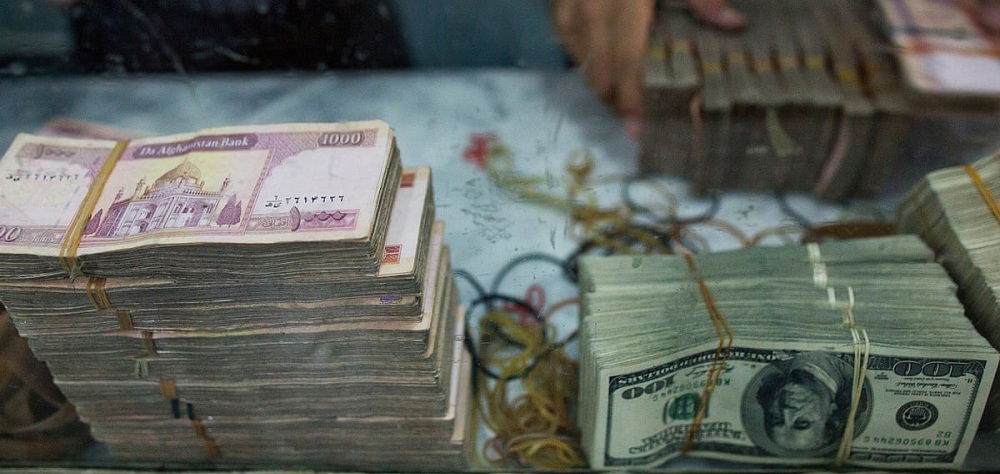Alwaght- Despite their claims, the Taliban have declined to make progress in rebuilding political and economic stability in Afghanistan after 9 months of assumption of power. Afghanistan is immersed in a critical economic situation as its dealings with the outside world have decreased following Taliban takeover in August 2021. This led to the ruling group adopting tough conomic policies. In the latest one, it approved new regulations to the foreign currency market, stating that the exchangers should pay 5 million afghanis as fees to be given work licence.
Abdul Rahman Zirak, spokesman for the Currency Exchange Union, said thousands of exchangers across the country closed in protest to conditions set by the central bank. The central bank has required them to pay €2 million more than before for guarantee to obtain a business license.
The Taliban intends to ask all money changers to renew their licenses, and all transactions will be done online, and brokers who fail to meet the new standards will face legal actions. The group introduced these regulations to meet the demands of the international community in the fight against money laundering and terrorist funding, according to some sources familiar with the move.
Because the banking system in Afghanistan is on a highly shaky ground, money changers are also involved in certain financial activities, such as money transfer or lending to traders or farmers, which are usually defined within the scope of the banks' duties. Officials of the Afghan Currency Exchange Union have stated that the new license laws are based on the laws of Western countries and its implementation in Afghanistan has created difficult conditions for money changers.
Despite activity of various state and private banks in Afghanistan, most of transactions and transfers are done via the exchangers. The massive services of them inside and outside Afghanistan have pushed the Taliban to organize their activities. With their new regulations, the Taliban seek to meet some of their foreign currency needs as the outlook for the US releasing Afghanistan currency reserves remains dim.
Afghanistan heading to economic collapse
Afghanistan has been grappling with an economic and employment crisis since the Taliban took over the power and subsequently the US froze Afghanistan assets abroad. Political instability has caused a severe shortage of liquidity in the market, and the value of the national currency against foreign currencies has plummeted. Afghanistan's economy used to rely on cash coming in from abroad and flowing to the central bank from there, but now the shortage of liquidity has disrupted this process. Experts warn that the cash shortage could further weaken Afghanistan's already teetering economy.
Last year, the Taliban government banned foreign currencies across the country, instructing people to use national currency for their dealings. They have repeatedly called on the international community to recognize their caretaker government to pave the way for the lifting of Western sanctions, but no country has agreed to recognize it. The US has also frozen Afghanistan's assets abroad, effectively barring the Taliban from accessing those assets that could address some of the economic woes.
Western sanctions after Taliban takeover have inflicted irreparable damage on Afghans, and the UN High Commissioner for Refugees (UNHCR) has warned of a dire economic situation in Afghanistan, saying the country is nearing an "irreversible point" in terms of economic reconstruction.
Since the rise of the Taliban, the closure of many businesses and the lack of transparency in banks and the economic crisis have put so much pressure on the people in the crisis-hit nation, with many people turning to selling their home furniture to make ends meet.
Global estimates suggest that more than 95 percent of Afghanistan's population is likely to live below the poverty line within the next year, and that the economic situation in the country is "catastrophic", and the Taliban have shown that they cannot solve problems without foreign aid and foreign exchange reserves.
The freezing of Afghanistan's assets abroad has drawn a sharp reaction from the Taliban, with officials in the group repeatedly calling on Washington to shoulder responsibility and lift sanctions and free foreign resources instead of focusing on Taliban's cultural policies. Washington, however, tied access to these resources to settlement of political issues in the country.
One of Washington's pressure levers on the Taliban is the $7 billion of Afghanistan central bank's assets frozen in the US. The Americans believe that by releasing these assets, the Taliban may use them to advance the plans of their so-called Islamic Emirate. On the other side, the Taliban have shown in recent months that they seek to strengthen the foundations of their rule rather than solve problems of people.
Therefore, with the Taliban declining to show a positive and persuasive face of its rule over the past 9 months in order for the the international community to recognize it, Afghanistan's assets are expected to remain blocked and the country's catastrophic situation deteriorate. The sanctions have forced down the national Afghanistan currency to record lows, hence increasing the import costs and concerns about an economic collapse.
Afghanistan's total foreign reserves are estimated at more than $10 billion, of which $7 billion is held in the US and another $3 billion in European banks and institutions. Being short of financial resources, the Taliban has been unable to run its governance and pay its employees for months, leading to social unrest.
The currency reserves are seen Afghanistan's financial support that if not used to develop the infrastructures, they can cause a tremendous crisis. But the Taliban have no clear financial mechanism to use these funds, and if they are released, they use them mainly in areas missing the economic improvement opportunity, prospectively sending the economy and national currency value in decline further.



























